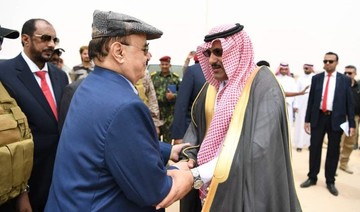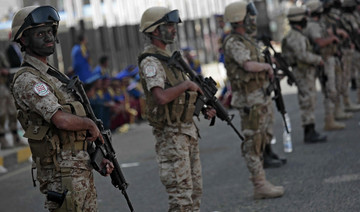NEW YORK: The UN special envoy for Yemen Martin Griffiths plans to invite warring parties to Geneva on Sept. 6 to discuss a framework for peace talks.
Addressing a UN Security Council meeting on Thursday, Griffiths said the talks would also discuss confidence-building measures to end the conflict.
The last attempt to resolve the conflict through talks took place in Kuwait in 2016, but the negotiations collapsed after the Houthi militia rejected a UN peace plan.
Griffiths said his efforts in Yemen had enabled the UN to "narrow the gap between the parties" involved in the conflict.
"I am very conscious that each day costs lives which might have been saved," Griffiths said.
Earlier, Griffiths met with the UN ambassadors of the Saudi-led Arab coalition countries, including the UAE.
"The UAE continues to fully support Mr Griffiths in his efforts to advance a settlement and enforce Security Council resolution 2216," the UAE mission to the UN tweeted.
Special Envoy Martin Griffiths @OSE_Yemen briefs Amb @amouallimi & Amb Nusseibeh on his recent consultations on the political process in #Yemen. The #UAE continues to fully support @Mr_GriffithsUN in his efforts to advance a settlement and enforce #SC resolution 2216. pic.twitter.com/XJmIoNDYtD
— UAE Mission to UN (@UAEMissionToUN) August 2, 2018
Griffiths has recently been shuttling between the warring parties to avert a coalition assault on Hodeidah, Yemen's largest port which is still held by the Houthis but surrounded by pro-government forces.
"We have tried to find a way to avoid a battle for the city and the port of Hodeidah and we are still trying," Griffiths told the council.
US Ambassador to the United Nations Nikki Haley told the council: "We've hit a new sense of urgency in Yemen."
"If this is what's starting to happen, civilians are at risk, infrastructure is at risk and we as the international community have to demand that the two parties come together and understand the seriousness of this," Haley said.
She also again accused Iran of supporting the Houthis and condemned the Houthi missile attacks, which have targeted Saudi Arabia.
Asharq Al-Awsat, the sister newspaper of Arab News, reported early on Thursday that Griffiths was planning to convene the talks. The report said he was expected to use a different approach to his predecessor Ismail Ould Cheikh Ahmed, who stepped down after failing to make headway in ending the conflict.
The first round of Yemen talks were held in 2015 in Switzerland before moving to Kuwait in 2016.
The war in Yemen was ignited in 2014 when the Houthis seized the capital Sanaa and forced the internationally recognized governmnet to flee. The militia then launched an offensive to capture the rest of the country from pro-government forces, sparking Saudi Arabia to lead an Arab coalition to restore the government to power.
UN figures suggest at least 10,000 people have been killed in the conflict, while a further 2 million have been displaced.






















